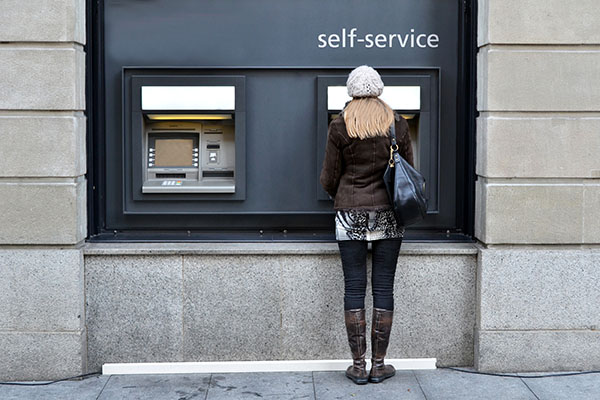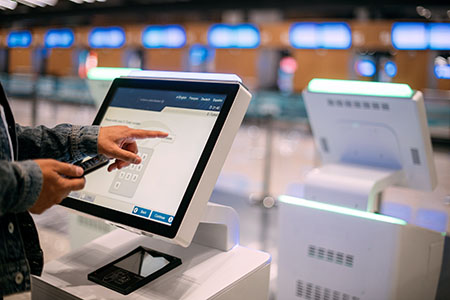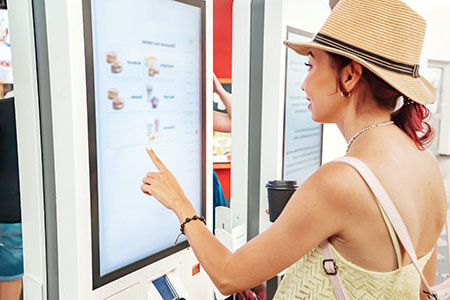

6-Nov-23 – I guess there was a time not too terribly long ago when we actually preferred doing business with people rather than machines. When we believed that the human interaction somehow added value to the transaction and could, if necessary, address questions and issues that might arise. This was based in no small part on our prior impressions and experiences in terms of the individuals we were likely to encounter on these occasions. They might even recognize us; we trusted them, they trusted us. We thought of them as our neighbors and part of the community, and we believed that they were generally interested in being of service to us.
Those times are long gone. These days you can walk into a branch bank and the humans sitting behind desks in cubicles are happy to tell you that they can’t even cash a check for you. You’ve got to wonder why they even bother to come to work?
Too many businesses today are replacing people with technology without understanding that the increasingly few customer-facing employees they still employ are their “front door” and most likely their prime point of customer contact.
 | As a result, these firms which are willing to insert just about anyone who can breathe into those sensitive positions are really selling themselves short and cruising for a bruising. |
Especially post-pandemic, your front-line troops are the ones who are best suited to welcome back, reassure, and re-connect directly with your customers. If your entire consumer service experience is automated and abstract, you can bet that Amazon will be handling your customers’ banking and other needs in no time at all. And if these folks have no real training, no authority, and not even cash on hand, they might just as well be ATMs.
Today, for a variety of economic and social reasons, all bets are off in terms of what passes for an acceptable workforce as well as appropriate dress and behaviors. The net effect is that we’re all, more or less, passively migrating or being actively pushed toward impersonal tech solutions – whether they work well or not – partly because the alternatives are so unfriendly, unappealing, or unappetizing.
And, believe me, it’s not just the banks that are a problem. Grocery stores, restaurants, bars, and bodegas all have similar issues. They may have massive and meaningless video displays and all kinds of Muzak, or a million different bottles of beer, but the overall retail experience just keeps getting worse and worse.
Maybe it’s post-pandemic PTSD or longing for times long past, or the fact that it’s flu season, but between the autumn’s abundant allergies, winter’s sniffles, and resurgent COVID issues, everyone seems to be walking around stressed and a little more sensitive to their surroundings than they might have in the past. Observant consumers are increasingly noticing the cutbacks and cost-saving efforts.
Too many businesses today are replacing people with technology without understanding that the increasingly few customer-facing employees they still employ are their ‘front door’ and most likely their prime point of customer contact. |
But the biggest and most obvious changes are in the attitudes, abilities, and anger of the people staffing the stores. I get that there’re a lot of folks unhappy with their work situations, but honestly, I don’t think it’s my fault, or that they should take it out on me.
A simple example. We’re entering the runny nose season and I’d like to suggest that Whole Foods and the other food purveyors and restaurateurs which have staff handling my food suggest to their esteemed team members that it’s a good time to keep the studs and other jewelry hanging out of their noses away from my meals. It gives me the creeps even apart from any contagions.
This stupid idea of letting their food handlers bring their whole selves to work needs to be cleaned up so they don’t bring COVID, colds, and other germs to work with them. If you think I’m the only one disgusted by the drips, feel free to ask anyone standing in line or seated at a table and subjected to this snotty spectacle. Self-service checkout machines still basically suck, but they’re looking better all the time compared with the bozos behind the registers and the brutal baggers.
Or how about the new restaurant kiosks where you’re supposed to order your food as you enter and then wait for someone behind the counter to bring it to you? We’re seeing more and more variations of this theme even in traditional restaurants – not just fast-food joints – as a way to cut back on wait staff.
Needless to say, these displays have all the flexibility and warmth of an ice cube, and you end up feeling just like another cog in the system. |  |
They make you long for the crabby old servers who at least knew what you wanted and seemed slightly interested as well. It’s hard to escape the subtle message of “eat and get out” that so many of these places give off. Not exactly comfort food. But don’t forget to leave a generous tip as the display officiously reminds you.
Now’s the time that smart business builders and owners need to take a step or two back and decide what business they’re in and how they want that business to operate. Frankly, I think most of them – if they could mystery shop their own places – would be shocked and disappointed at how unpleasant the whole process has become.
Every business is the same in at least one way – whatever you’re selling, it’s your people who deliver the goods. Starbucks takes a lot of crap for a variety of reasons, but one thing that Howard Schultz said at the outset of the business was the truest observation ever. He said “we’re not in the coffee business, serving people. We’re in the people business, serving coffee.”
Saving on staff, cutting back on training, trying to do things cheaply that you shouldn’t do at all – all send the same message to your customers. And not a happy one. Technology is a tool, not a savior in these situations. Care for your customers first and then worry about the costs.
 | Howard Tullman is General Managing Partner for G2T3V, LLC – Investors in Disruptive Innovators, and for Chicago High Tech Investors, LLC. He is also the author of Words of Wisdom: A 60-year compilation. |
